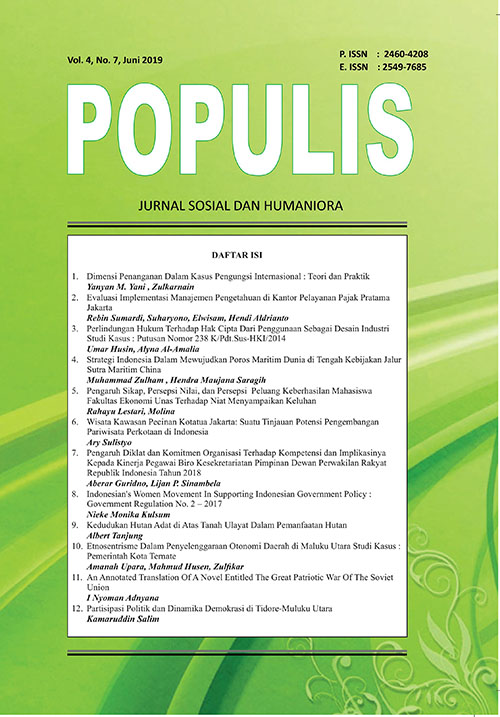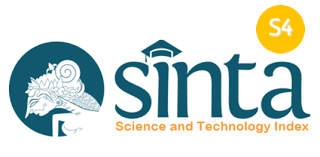INDONESIAN'S WOMEN MOVEMENT IN SUPPORTING INDONESIAN GOVERMENT POLICY (GOVERMENT REGULATION NO. 2 - 2017)
DOI:
https://doi.org/10.47313/pjsh.v4i1.595Keywords:
women movement, social movement, government policy, women’s movement, indonesianAbstract
Abstract
Indonesia has become independent country since 1945, however this country still facing many internal conflicts. The power of Soeharto (the second Indonesian President) regime that lasted for 32 years, spread fears to many people which make them silenced. After the reformation in 1998 that led to the collapsed of that regime, Indonesia experienced a period of “freedom from fear”. Since then there are many new mass organizations emerged in Indonesia. Some of these mass organizations are arrogance and causes fear to Indonesian people. Therefore, in the current era of president Jokowi leadership, the government acts firmly on those mass organizations by issuing Government Regulation No.2 which was signed on July 10, 2017. Moreover, this new regulation has raised pros and contras in society. One group of people who care about this is the Women Indonesian Care Group which consists of women from various segments on a racial, religious, educational, work and age basis. The researcher is interested to raise this matter as a research because it is a new thing in Indonesia where group consisting mostly of mothers perform an action in the form of a demonstration conducted in front of Parliament Building/House of Representative on Friday, July 27, 2017. It turns out that those mothers who have been upset and disturbed by the actions done by certain mass organizations. Thus they feel the need to do the demonstration. The method of this research is qualitative, researchers will conduct interviews with the perpetrators of demos, documentation studies and literature studies. Research is still underway until now.
References
Banazac, Lee Ann (1996). Women’s Movements and Women in Movements: Influencing American Democracy from the “Outside”? (https://rooneycenter.nd.edu/assets/11293/womens_movements.pdf).
Denzin, N. K., & Lincoln, Y. (2005). The Sage Handbook of Qualitative Research (Third ed.), California: Sage Publication.
http://www.bbc.com/indonesia/trensosial-41022914.
http://nasional.kompas.com/read/2017/05/08/16460231/benih.radikalisme.mulai.masuki.sekolah.
http://setara-institute.org/lampu-kuning-meningkatnya-radikalisme-di-sekolah-sekolah-indonesia.
https://www.nidirect.gov.uk/articles/government-policy.
Jati, Wasisto Raharjo (2014). HISTORISITAS POLITIK PEREMPUAN INDONESIA. Paramita: Historical Studies Journal.
Tilly, Charles (2004) Social Movements, 1768–2004, Boulder, CO, Paradigm Publishers.
http://www.bbc.com/indonesia/trensosial-41022914.
http://nasional.kompas.com/read/2017/05/08/16460231/benih.radikalisme.mulai.masuki.sekolah.
http://setara-institute.org/lampu-kuning-meningkatnya-radikalisme-di-sekolah-sekolah-indonesia.
Downloads
Published
Issue
Section
License
- Hak publikasi atas semua materi informasi yang tercantum dalam situs jurnal ini dipegang oleh dewan redaksi/editor dengan sepengetahuan penulis. Pengelola Jurnal akan menjunjung tinggi hak moral penulis.
- Aspek legal formal terhadap akses setiap informasi dan artikel yang tercantum dalam situs jurnal ini mengacu pada ketentuan lisensi Creative Commons Atribusi-NonCommercial-No Derivative (CC BY-NC-ND), yang berarti bahwa hanya dengan izin penulis, informasi dan artikel Jurnal BACA dapat didistribusikan ke pihak lain dengan tanpa merubah bentuk aslinya untuk tujuan non-komersial.
- Setiap terbitan Populis Jurnal Sosial dan Humaniora, baik cetak maupun elektronik, bersifat open access untuk tujuan pendidikan, penelitian, dan perpustakaan. Di luar tujuan tersebut, penerbit atau pengelola jurnal tidak bertanggung jawab atas terjadinya pelanggaran hak cipta yang dilakukan oleh pembaca atau pengakses.










